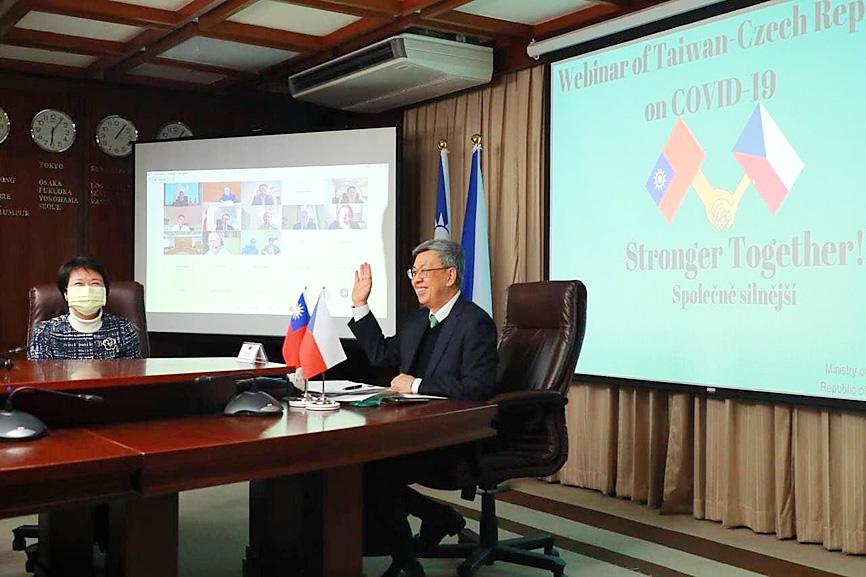Public health experts on Wednesday joined their counterparts in the Czech Republic in a virtual conference to discuss COVID-19 measures, the latest example of deepening cooperation between the two nations.
Separated into five segments, the Webinar featured four discussions led by a Taiwanese and a Czech speaker, and concluded with a panel discussion moderated by former vice president Chen Chien-jen (陳建仁).
National Health Research Institutes (NHRI) president Liang Kung-yee (梁賡義) and Czech Senator Jiri Drahos led the opening remarks, during which they touched on pandemic policy, vaccine development and clinical treatment, among other topics.

Photo courtesy of the Ministry of Foreign Affairs
Drahos, a former president of the Czech Academy of Sciences, praised Taiwan’s success at containing the pandemic, saying that there is a lot to learn from Taiwan with regards to policy and medicine, a news release by the Ministry of Foreign Affairs said yesterday.
He also thanked the government and the public for donating masks, respirators and other equipment to help the Czech Republic fight the pandemic, the ministry said.
Opening remarks were followed by discussions on epidemiology, vaccine development and lab diagnosis, and medical therapy, with the talks led by Centers for Disease Control Deputy Director-General Philip Lo (羅一鈞), University of Ostrava dean Rastislav Mad’ar, NHRI Vaccine Research and Development Center chief executive officer Liu Shih-jen (劉士任), Masaryk University professor Omar Sery, National Taiwan University Hospital vice director of internal medicine Wang Jen-tay (王振泰) and University Hospital Ostrava Anesthesiology Clinic head Pavel Sevcik.
Panelists agreed that observations from the Czech Republic as Europe continues to battle COVID-19 can aid Taiwanese prevention efforts, as collaboration in the field further demonstrates the solidarity and friendship between the two nations, the ministry said.
Chen shared some of the lessons Taiwan learned from staving off SARS, while emphasizing that international cooperation is the key to successfully containing a pandemic, it said.
On April 1 last year, Taiwan and the Czech Republic issued a joint statement listing eight areas of cooperation on COVID-19, including research, provision of supplies and information sharing.
The statement was followed by a historic visit in August and September last year by a delegation led by Czech Senate President Milos Vystrcil.
Drahos had planned to visit Taiwan in October last year, but postponed his trip due to challenges presented by the pandemic.
Asked about a potential visit by Drahos, the ministry said that the government welcomes any Czech officials who want to visit Taiwan, but it has no further information to provide at the moment.

EVA Airways today confirmed the death of a flight attendant on Saturday upon their return to Taiwan and said an internal investigation has been launched, as criticism mounted over a social media post accusing the airline of failing to offer sufficient employee protections. According to the post, the flight attendant complained of feeling sick on board a flight, but was unable to take sick leave or access medical care. The crew member allegedly did not receive assistance from the chief purser, who failed to heed their requests for medical attention or call an ambulance once the flight landed, the post said. As sick

A drunk woman was sexually assaulted inside a crowded concourse of Taipei Railway Station on Thursday last week before a foreign tourist notified police, leading to calls for better education on bystander intervention and review of security infrastructure. The man, surnamed Chiu (邱), was taken into custody on charges of sexual assault, taking advantage of the woman’s condition and public indecency. Police discovered that Chiu was a fugitive with prior convictions for vehicle theft. He has been taken into custody and is to complete his unserved six-month sentence, police said. On Thursday last week, Chiu was seen wearing a white

EVA Airways, one of the leading international carriers in Taiwan, yesterday said that it was investigating reports that a cabin crew manager had ignored the condition of a sick flight attendant, who died on Saturday. The airline made the statement in response to a post circulating on social media that said that the flight attendant on an outbound flight was feeling sick and notified the cabin crew manager. Although the flight attendant grew increasingly ill on the return flight, the manager did not contact Medlink — a system that connects the aircraft to doctors on the ground for treatment advice during medical

The Taichung District Court yesterday confirmed its final ruling that the marriage between teenage heir Lai (賴) and a man surnamed Hsia (夏) was legally invalid, preventing Hsia from inheriting Lai’s NT$500 million (US$16.37 million) estate. The court confirmed that Hsia chose not to appeal the civil judgement after the court handed down its ruling in June, making the decision final. In the June ruling, the court said that Lai, 18, and Hsia, 26, showed “no mutual admiration before the marriage” and that their interactions were “distant and unfamiliar.” The judge concluded that the couple lacked the “true intention of